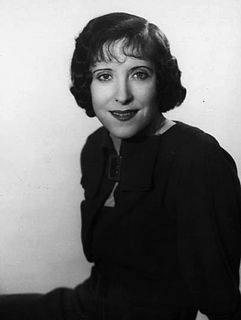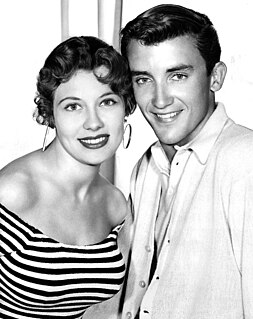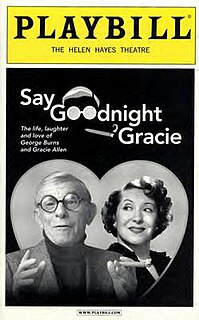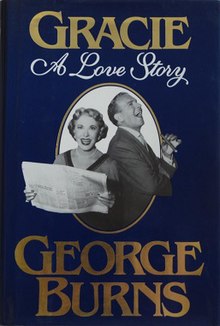
Grace Ethel Cecile Rosalie Allen was an American vaudevillian, singer, actress, and comedian who became internationally famous as the zany partner and comic foil of husband George Burns, her straight man, appearing with him on radio, television and film as the duo Burns and Allen.

George Burns was an American comedian, actor, writer, and singer, and one of the few entertainers whose career successfully spanned vaudeville, radio, film and television. His arched eyebrow and cigar-smoke punctuation became familiar trademarks for over three-quarters of a century. He and his wife Gracie Allen appeared on radio, television and film as the comedy duo Burns and Allen.
Lambchops is an 8-minute American comedy Vitaphone short subject released in October 1929, which depicts a vaudeville performance by Burns and Allen of the comedy routine "Lambchops" written by Al Boasberg.

Burns and Allen was an American comedy duo consisting of George Burns and his wife, Gracie Allen. They worked together as a successful comedy team that entertained vaudeville, film, radio, and television audiences for over forty years.

Joan Allen is an American actress. She began her career with the Steppenwolf Theatre Company in 1977, won the 1984 Drama Desk Award for Outstanding Actress in a Play for And a Nightingale Sang, and won the 1988 Tony Award for Best Actress in a Play for her Broadway debut in Burn This. She is also a three-time Academy Award nominee, receiving Best Supporting Actress nominations for Nixon (1995) and The Crucible (1996), and a Best Actress nomination for The Contender (2000).

Beatrice Benaderet was an American actress and comedienne. Born in New York City and raised in San Francisco, she began performing in Bay Area theatre and radio before embarking on a Hollywood career that spanned over three decades. Benaderet first specialized in voice-over work in the golden age of radio, appearing on numerous programs while working with comedians of the era such as Jack Benny, Burns and Allen, and Lucille Ball. Her expertise in dialect and characterization led to her becoming Warner Bros. Cartoons' leading voice of female characters in their animated cartoons of the early 1940s through the mid-1950s.

The George Burns and Gracie Allen Show, sometimes called The Burns and Allen Show, was a half-hour television series broadcast from 1950 to 1958 on CBS. It starred George Burns and Gracie Allen, one of the most enduring acts in entertainment history. Burns and Allen were headliners in vaudeville in the 1920s, and radio stars in the 1930s and 1940s. Their situation comedy TV series received Emmy Award nominations throughout its eight-year run.
The Television Academy Hall of Fame honors individuals who have made extraordinary contributions to U.S. television. The hall of fame was founded by former Academy of Television Arts & Sciences (ATAS) president John H. Mitchell (1921–1988). Inductions are not held every year.

Ronald Jon Burns was an American television actor. He is primarily remembered as the son of comedians George Burns and Gracie Allen and a regular cast member of The George Burns and Gracie Allen Show (1950–58) on CBS.

A Damsel in Distress is a 1937 English-themed Hollywood musical comedy film starring Fred Astaire, George Burns, Gracie Allen and Joan Fontaine. Loosely based upon P.G. Wodehouse's 1919 novel of the same name, and the 1928 stage play written by Wodehouse and Ian Hay, it has music and lyrics by George and Ira Gershwin, and was directed by George Stevens, the second Astaire musical directed by Stevens; the first was Swing Time.

Honolulu is a 1939 American musical comedy film directed by Edward Buzzell and starring dancer Eleanor Powell, Robert Young, George Burns and Gracie Allen. The picture was produced by Metro-Goldwyn-Mayer. Also appearing in the film are Rita Johnson, Eddie "Rochester" Anderson, Sig Rumann and Ruth Hussey.

The Big Broadcast of 1936 is a 1935 American comedy film directed by Norman Taurog, and is the second in the series of Big Broadcast movies.

We're Not Dressing is a 1934 pre-Code screwball musical comedy film directed by Norman Taurog and starring Bing Crosby, Carole Lombard, George Burns, Gracie Allen and Ethel Merman. Based on the 1902 J. M. Barrie play The Admirable Crichton, the film is about a beautiful yacht owner (Lombard) who becomes stranded on an island with her socialite friends, a wacky husband-and-wife research team and a singing sailor (Crosby). The supporting cast features Leon Errol and Ray Milland.

Say Goodnight, Gracie is a one-man play by Rupert Holmes.
Rodney Amateau was an American film and television screenwriter, director, and producer.

College Swing, also known as Swing, Teacher, Swing in the U.K., is a 1938 comedy film directed by Raoul Walsh and starring George Burns, Gracie Allen, Martha Raye, and Bob Hope. The supporting cast features Edward Everett Horton, Ben Blue, Betty Grable, Jackie Coogan, John Payne, Robert Cummings, and Jerry Colonna.

Stanley Shapiro was an American screenwriter and producer responsible for three of Doris Day's most successful films.

Are Husbands Necessary? is a 1942 American comedy film directed by Norman Taurog and starring Ray Milland and Betty Field. It follows the misadventures of a wacky wife and her sometimes exasperated, but loving, banker husband. The film's screenplay was adapted by the husband-and-wife writing team of Tess Slesinger and Frank Davis, from the novel Mr. and Mrs. Cugat, the Record of a Happy Marriage by Isabel Scott Rorick. This novel would later be a source for the related 1948 radio series My Favorite Husband starring Lucille Ball, which itself would evolve into the television series I Love Lucy.
Love in Bloom is a 1935 American comedy film directed by Elliott Nugent and written by Frank R. Adams, J.P. McEvoy, John P. Medbury and Keene Thompson. The film stars George Burns, Gracie Allen, Joe Morrison, Dixie Lee, J. C. Nugent, Lee Kohlmar and Richard Carle. The film was released on March 15, 1935, by Paramount Pictures.

Robert Ellis was an American film and television actor in the 1940s and 1950s, who was the last actor to play Henry Aldrich on the radio series The Aldrich Family.
















